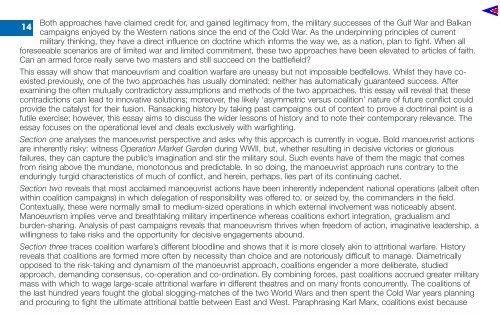Volume 5 No 2 - Royal Air Force Centre for Air Power Studies
Volume 5 No 2 - Royal Air Force Centre for Air Power Studies
Volume 5 No 2 - Royal Air Force Centre for Air Power Studies
You also want an ePaper? Increase the reach of your titles
YUMPU automatically turns print PDFs into web optimized ePapers that Google loves.
Both approaches have claimed credit <strong>for</strong>, and gained legitimacy from, the military successes of the Gulf War and Balkan<br />
14<br />
campaigns enjoyed by the Western nations since the end of the Cold War. As the underpinning principles of current<br />
military thinking, they have a direct influence on doctrine which in<strong>for</strong>ms the way we, as a nation, plan to fight. When all<br />
<strong>for</strong>eseeable scenarios are of limited war and limited commitment, these two approaches have been elevated to articles of faith.<br />
Can an armed <strong>for</strong>ce really serve two masters and still succeed on the battlefield?<br />
This essay will show that manoeuvrism and coalition warfare are uneasy but not impossible bedfellows. Whilst they have coexisted<br />
previously, one of the two approaches has usually dominated: neither has automatically guaranteed success. After<br />
examining the often mutually contradictory assumptions and methods of the two approaches, this essay will reveal that these<br />
contradictions can lead to innovative solutions; moreover, the likely ‘asymmetric versus coalition’ nature of future conflict could<br />
provide the catalyst <strong>for</strong> their fusion. Ransacking history by taking past campaigns out of context to prove a doctrinal point is a<br />
futile exercise; however, this essay aims to discuss the wider lessons of history and to note their contemporary relevance. The<br />
essay focuses on the operational level and deals exclusively with warfighting.<br />
Section one analyses the manoeuvrist perspective and asks why this approach is currently in vogue. Bold manoeuvrist actions<br />
are inherently risky: witness Operation Market Garden during WWII, but, whether resulting in decisive victories or glorious<br />
failures, they can capture the public’s imagination and stir the military soul. Such events have of them the magic that comes<br />
from rising above the mundane, monotonous and predictable. In so doing, the manoeuvrist approach runs contrary to the<br />
enduringly turgid characteristics of much of conflict, and herein, perhaps, lies part of its continuing cachet.<br />
Section two reveals that most acclaimed manoeuvrist actions have been inherently independent national operations (albeit often<br />
within coalition campaigns) in which delegation of responsibility was offered to, or seized by, the commanders in the field.<br />
Contextually, these were normally small to medium-sized operations in which external involvement was noticeably absent.<br />
Manoeuvrism implies verve and breathtaking military impertinence whereas coalitions exhort integration, gradualism and<br />
burden-sharing. Analysis of past campaigns reveals that manoeuvrism thrives when freedom of action, imaginative leadership, a<br />
willingness to take risks and the opportunity <strong>for</strong> decisive engagements abound.<br />
Section three traces coalition warfare’s different bloodline and shows that it is more closely akin to attritional warfare. History<br />
reveals that coalitions are <strong>for</strong>med more often by necessity than choice and are notoriously difficult to manage. Diametrically<br />
opposed to the risk-taking and dynamism of the manoeuvrist approach, coalitions engender a more deliberate, studied<br />
approach, demanding consensus, co-operation and co-ordination. By combining <strong>for</strong>ces, past coalitions accrued greater military<br />
mass with which to wage large-scale attritional warfare in different theatres and on many fronts concurrently. The coalitions of<br />
the last hundred years fought the global slogging-matches of the two World Wars and then spent the Cold War years planning<br />
and procuring to fight the ultimate attritional battle between East and West. Paraphrasing Karl Marx, coalitions exist because
















